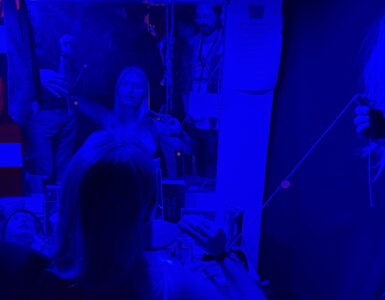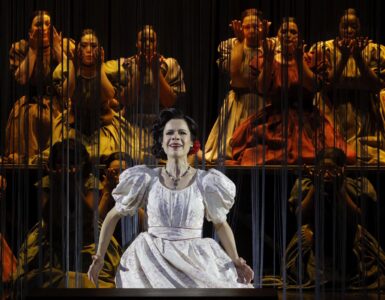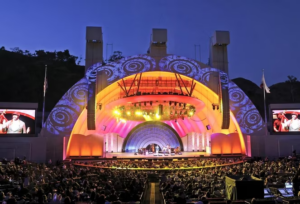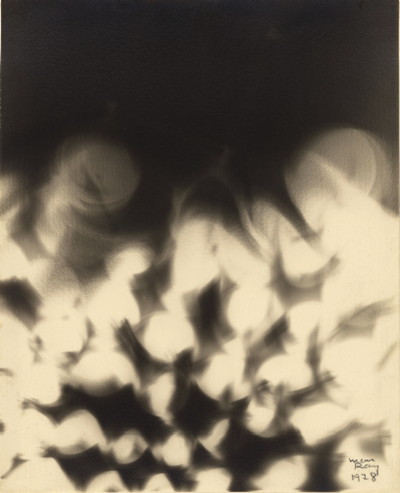
An extraordinary and timely exhibition, Light, Paper, Process: Reinventing Photography is an excellent example of what The Getty Museum does best, which is place important art works within their historical context.
This exhibition is timely because of interest in the process of photography and it explores so many facets of the artform, raising questions such as what an object is, how it is made and how it reveals the intention of the artist.
Since the advent of the digital world, we have gained radically different results with the photographic process. The original method of developing photography was manual, irreversible and often had an unknown outcome, whereas digital photography is generally reversible. Early photography involved controlling and not controlling the materials of the final product.
It was a real experimental art form.
On view now until September 6, at the Getty Center, Light, Paper, Process: Reinventing Photography features the work of seven artists who explore the essence of analog photography, distilling it to its basic components of light-sensitive emulsions and chemical development and challenging us to see the medium anew.
Curator of this fascinating exhibition is Virginia Heckert, head of the Getty Museum’s Department of Photographs.
Explains Heckert, “Some works were completed as recently as six months ago. Within the eight spaces of the exhibition, the goal is to look at these artists in the re-examination of the medium of photography.”
The prologue to the exhibition can be seen in the first room, where selected works from the permanent collection are on display. These classic works demonstrate minimal materials and unique techniques and presents an overview of experimental practices during the early twentieth century. Thereafter each of the seven artists gain a discrete space.
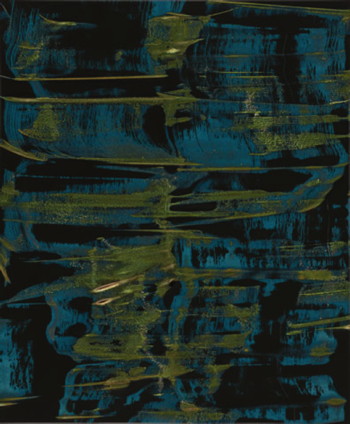
In investigating the work of contemporary artists Matthew Brandt, Marco Breuer, John Chiara, Chris McCaw, Lisa Oppenheim, Alison Rossiter, and James Welling, the exhibition scrutinizes their spirit of invention and discovery as a point of departure. It examines the work of these seven artists in exploring their engagement with the essential elements of photography as they focus their investigations on the light sensitivity and chemical processing of photographic papers.
Allison Rossiter’s work is an investigation of expired photo photographic paper from 1911 to the 1970s. Since she started working with sheets of expired gelatin silver paper in 2007, Alison Rossiter uses ordinary darkroom techniques to bring to life found photograms and compositions. By dipping and bathing the paper in various chemicals she creates compositions and images that suggest landscapes or mid-twentieth-century painterly abstractions.
Working since the early 1990s without a camera or film, Marco Breuer subjects black-and-white and color photographic papers to various acts of burning, abrading or scraping to create nonrepresentational works that have the immediacy of abstract drawings. Like a burning coal or an ember, he attempts to make a shape on a piece of paper using a stripped-down approach. Says Breuer, “I focus on the immediate interaction with my materials,” even to the extent of “finding ways to avoid color using a process of subtraction.” For one remarkable image, Breuer used the guts of an electric frying pan to make the exposure by moving the coil over the photographic paper.
Loading oversized custom-built cameras with photographic paper rather than film negatives, John Chiara creates unique large-scale color prints that convey a hands-on aesthetic characterized by irregular edges and unevenly saturated colors. Chiara remarked that he was about to “capture the past” by photographing a landscape where you could see the “ghosts of a fire from three years’ past.”
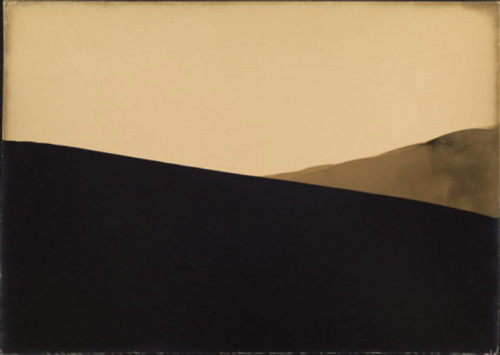
J. Paul Getty Museum presents
Light, Paper, Process: Reinventing Photography
Runs through September 6, 2015
J. Paul Getty Museum
1200 Getty Center Drive,
Los Angeles, California.
Visiting the Getty Center:
The Getty Center is open Tuesday through Friday and Sunday from 10 a.m. to 5:30 p.m., and Saturday from 10 a.m. to 9 p.m. It is closed Monday and most major holidays. Admission to the Getty Center is always free. Parking is $15 per car, but reduced to $10 after 5 p.m. on Saturdays and for evening events throughout the week. No reservation is required for parking or general admission. Reservations are required for event seating and groups of 15 or more. Please call (310) 440-7300 (English or Spanish) for reservations and information. The TTY line for callers who are deaf or hearing impaired is (310) 440-7305. T
Additional information is available at their official site.
Sign up for e-Getty here to receive free monthly highlights of events at the Getty Center and the Getty Villa via e-mail, or visit their site for a complete calendar of public programs.



